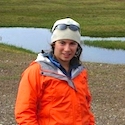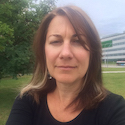By: Alice C. Bradley, Williams College; Maribeth Murray, Arctic Institute of North America; Malgorzata Smieszek, Arctic University of Norway

The need for ongoing improvement to Arctic observation, flow of information, and use of data from the Arctic observing system remains urgent. The current trajectory of global climate and environmental change continues unchecked. Observational information from the Arctic is widely needed at local, regional, and global scales as it is a crucial prerequisite to any informed decision-making to respond and adapt to change within the region and beyond. The Arctic plays a critical role influencing and driving planetary change and is part of the global geopolitical system. As such, Arctic observing must contribute to and enhance existing global observing networks to support forecasting, planning, adaptation, mitigation, and the identification of emerging issues in the context of ongoing change. The 2022 Arctic Observing Summit (AOS 2022) brought many members of the Arctic observing community back together for the sixth time since 2013, in person and virtually, from across the Arctic and around the world. The AOS is a biennial event convened as part of the Sustaining Arctic Observing Networks (SAON) initiative to guide the design, coordination, and long-term operation of an international network of observing systems that improves our understanding of, and response to, Arctic change.
Six working groups—Food Security, Regional to Global Observing, Data Sharing, System Implementation, Utility and Benefits, and Capacity Sharing—met at the 2022 Summit. Their recommendations and calls to action are:
Recommendations and Calls to Action
- While food security is defined in a multitude of ways, thematic similarities such as sovereign access to traditional foods and autonomy over traditional activities, cultural practices, and exchange are common throughout most. Food Security is threatened by externally imposed conflicts and drivers such as colonial systems of research, management, and policy; food insecurity is not solved by access to calories alone. These threats can be mitigated by centering Indigenous expertise and objectives; funding Indigenous representatives, liaisons, and existing networks and organizations; ensuring observations are relative to end users; and employing equitable representation and co-production of knowledge to ensure a representative benefits framework.
- Global observing systems should broaden coverage in the North. The development of the Roadmap for Arctic Observing and Data Systems (ROADS) and Shared Arctic Variables (SAVs) needs to happen in concert with the global observing systems; SAVs can address the observing needs of Arctic Indigenous peoples and Arctic communities not reflected in global essential variables.
- A need to continue efforts to coordinate and bring data systems together in an integrated Arctic Observing System and systematically enhance the usability of scientific data were identified. Specifically, we call for the engagement of governments, Indigenous organizations, and the broad Arctic community in a joint effort of the Arctic Council, Arctic Spatial Data Infrastructure, and Arctic Data Committee to facilitate the development of research data policy for the Arctic.
- A process for defining Shared Arctic Variables has been developed: funded projects should now proceed with building expert panels and proposing Shared Arctic Variables, in dialogue with SAON's ROADS Advisory Panel.
- Increase support for efforts aimed at developing broader data literacy among the Arctic Observing Network to ensure equity in relation to access, use, and benefit; develop an instrument to assess and evaluate how the system and data are providing utility and benefit; partner with the private sector to facilitate data acquisition and knowledge sharing; and establish regional coordination hubs in order to service critical societal needs using observational research.
- Capacity sharing in the context of Arctic observing requires that scientists come to the Arctic prepared to learn from—rather than just educate—the communities where they intend to work.
This year emphasized the indisputable importance of the inclusive and equitable participation of Arctic Indigenous Peoples and communities in both the summit and the observing system more broadly. The summit took steps to move towards the implementation of capacity sharing and the continued inclusion of Indigenous Knowledge and needs in equal measure to western science and data. Both are needed if the observing system is to be successful in sustainably serving the needs of, and providing benefit to, Arctic communities and beyond.
The full Conference Statement builds on deliberations at AOS 2022. It summarizes the recommendations and calls to action from the participants. It is available on the AOS 2022 website.
About the Authors
 Alice C. Bradley is an Assistant Professor of Geosciences at Williams College, Williamstown, Massachusetts. Alice did her postdoc at Dartmouth College working on coastal sea-ice processes using remote sensing and in situ observational approaches. She earned her PhD at University of Colorado Boulder studying ice-ocean interactions from an observational perspective. Her thesis focused on freeze-up, though her research spans topics including upper ocean heat content, polynyas, and seasonal ice growth. She also has expertise in autonomous observing systems, including unmanned aircraft. Alice was the President of the Association of Polar Early Career Scientists (APECS) and now serves in an advisory capacity for the organization.
Alice C. Bradley is an Assistant Professor of Geosciences at Williams College, Williamstown, Massachusetts. Alice did her postdoc at Dartmouth College working on coastal sea-ice processes using remote sensing and in situ observational approaches. She earned her PhD at University of Colorado Boulder studying ice-ocean interactions from an observational perspective. Her thesis focused on freeze-up, though her research spans topics including upper ocean heat content, polynyas, and seasonal ice growth. She also has expertise in autonomous observing systems, including unmanned aircraft. Alice was the President of the Association of Polar Early Career Scientists (APECS) and now serves in an advisory capacity for the organization.
 Maribeth Murray, Executive Director of the Arctic Institute of North America, is a transdisciplinary scholar with expertise in both the social and natural sciences. Her research activities are focused in three areas: the integration of historic and modern data sets to better understand how the Arctic functions as a system; mobilizing genomics and genomics tools for Arctic biodiversity conservation and wildlife management; and research and strategic planning for the ongoing development and implementation of an internationally supported Arctic Observing System.
Maribeth Murray, Executive Director of the Arctic Institute of North America, is a transdisciplinary scholar with expertise in both the social and natural sciences. Her research activities are focused in three areas: the integration of historic and modern data sets to better understand how the Arctic functions as a system; mobilizing genomics and genomics tools for Arctic biodiversity conservation and wildlife management; and research and strategic planning for the ongoing development and implementation of an internationally supported Arctic Observing System.
 Malgorzata (Gosia) Smieszek is the Project Coordinator at the University of Tromsø–The Arctic University of Norway and Adjunct Fellow at the East-West Center in Honolulu, Hawaii. Smieszek's research focuses on Arctic and international environmental governance, science-policy interface and Arctic scientific cooperation, and gender-environment nexus.
Malgorzata (Gosia) Smieszek is the Project Coordinator at the University of Tromsø–The Arctic University of Norway and Adjunct Fellow at the East-West Center in Honolulu, Hawaii. Smieszek's research focuses on Arctic and international environmental governance, science-policy interface and Arctic scientific cooperation, and gender-environment nexus.
